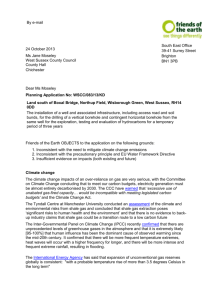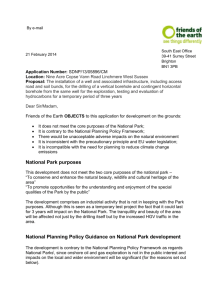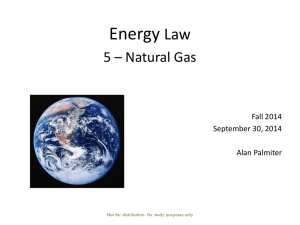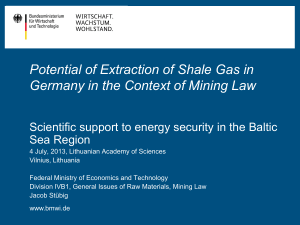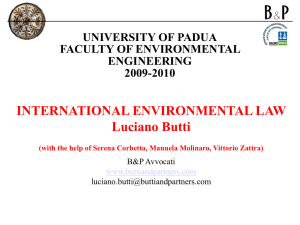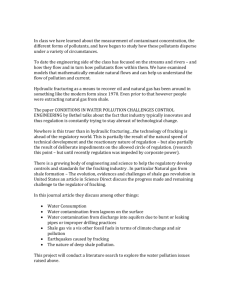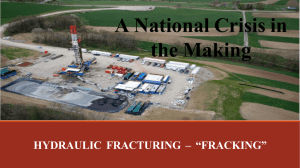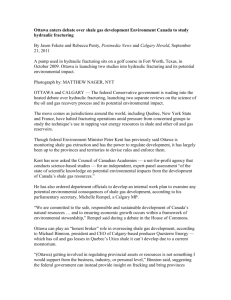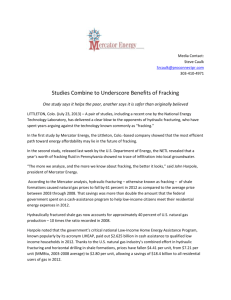Fracking Objection Template Letter: Climate & Environment
advertisement
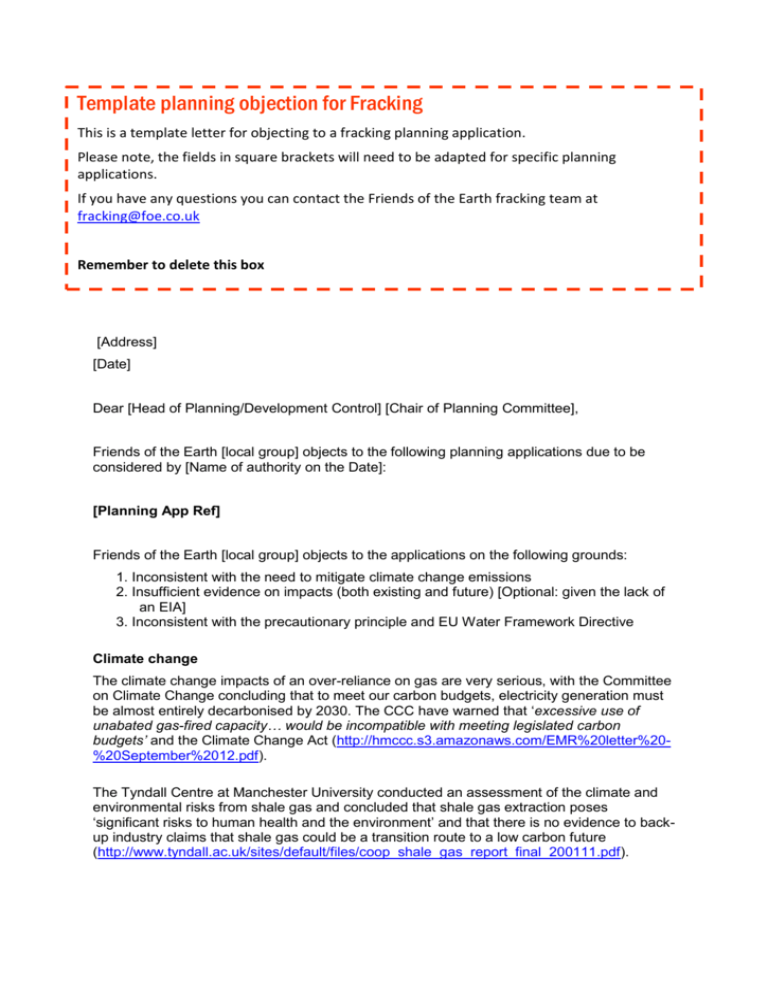
Template planning objection for Fracking This is a template letter for objecting to a fracking planning application. Please note, the fields in square brackets will need to be adapted for specific planning applications. If you have any questions you can contact the Friends of the Earth fracking team at fracking@foe.co.uk Remember to delete this box [Address] [Date] Dear [Head of Planning/Development Control] [Chair of Planning Committee], Friends of the Earth [local group] objects to the following planning applications due to be considered by [Name of authority on the Date]: [Planning App Ref] Friends of the Earth [local group] objects to the applications on the following grounds: 1. Inconsistent with the need to mitigate climate change emissions 2. Insufficient evidence on impacts (both existing and future) [Optional: given the lack of an EIA] 3. Inconsistent with the precautionary principle and EU Water Framework Directive Climate change The climate change impacts of an over-reliance on gas are very serious, with the Committee on Climate Change concluding that to meet our carbon budgets, electricity generation must be almost entirely decarbonised by 2030. The CCC have warned that ‘excessive use of unabated gas-fired capacity… would be incompatible with meeting legislated carbon budgets’ and the Climate Change Act (http://hmccc.s3.amazonaws.com/EMR%20letter%20%20September%2012.pdf). The Tyndall Centre at Manchester University conducted an assessment of the climate and environmental risks from shale gas and concluded that shale gas extraction poses ‘significant risks to human health and the environment’ and that there is no evidence to backup industry claims that shale gas could be a transition route to a low carbon future (http://www.tyndall.ac.uk/sites/default/files/coop_shale_gas_report_final_200111.pdf). The recent (September 2013) Inter-Governmental Panel on Climate Change report is that extreme weather is being caused now by climate change, and will in the future - more frequent hot and fewer cold temperature extremes, heat waves will occur with a higher frequency for longer, more intense and frequent extreme rainfall, resulting in flooding. Local government must take its climate change obligations seriously and refuse damaging development. The National Planning Policy Framework 2012 states in relation to climate change that it is a core planning principle (para 17): “support the transition to a low carbon future” and (para 93): “Planning plays a key role in helping shape places to secure radical reductions in greenhouse gas emissions…”. Friends of the Earth [local group] is therefore of the view that this application should be refused on climate change grounds. Precautionary principle The precautionary principle is a principle at the heart of environmental law to which the UK Government has committed since the UK signed the Rio Declaration on Environment and Development in 1992. This states (at Principle 15) that, “where there are threats of serious or irreversible damage, lack of full scientific certainty shall not be used as a reason for postponing cost-effective measures to prevent environmental degradation”. Article 191(2) of the Treaty on the Functioning of the European Union declares that EU policy on the environment “shall be based on the precautionary principle”. We are concerned that the local authority with respect to this application is not applying a precautionary approach in a case with a high level of public interest. The precautionary principle finds specific expression through international and EU law instruments to which the UK is a signatory (and in the case of EU law, bound) including the Water Framework Directive and the Habitats Directive. The Water Framework Directive applies strict standards and controls in relation in particular to groundwater. There is growing evidence in the UK and globally of the serious environmental impacts from hydraulic fracturing including to ecology, climate, water resources, air quality and seismic activity. The European Commission recently identified water contamination, water resource depletion, air pollution, biodiversity impacts and noise as high risk concerns in its report ‘Support to the identification of potential risks for the environment and human health arising from hydrocarbons operations involving hydraulic fracturing in Europe’ August 2012 (http://ec.europa.eu/environment/integration/energy/pdf/fracking%20study.pdf). On these grounds, we recommend that the local authority take a precautionary approach and refuse the application on the basis of the risk of “unacceptable adverse impacts” (para 143, National Planning Policy Framework). [Optional] Environmental Impact Assessment The importance of EIA to shale gas activities is underlined in a letter from EU Commissioner Janez Potocnik to Mr Mattias Groote on 26 January 2012, in which the Commission expresses its view that the EIA directive applies to unconventional hydrocarbon extraction using horizontal drilling and hydraulic fracturing at an exploration stage. In addition, the European parliament has recently resolved that EIA should apply to all shale gas activities. Any environmental permit process would benefit from the information required by an EIA. Council members in making their decision would also benefit from understanding in far greater detail than the application currently holds the possible environmental impacts. Friends of the Earth [local group] is of the view that the Environment Agency and the public lack comprehensive information on the impact of the proposed activity. Friends of the Earth [local group] believes that [this application/these applications] should be refused. Yours sincerely, [Name]
